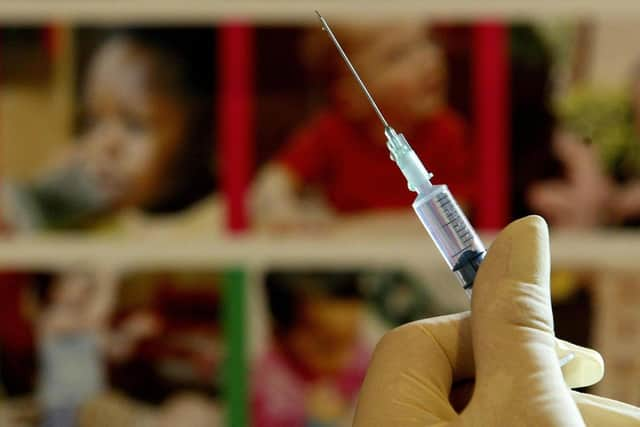Polio: Yorkshire parents urged to vaccinate babies as figures show almost one in 10 is unprotected
It comes after an outbreak of the life-threatening virus was detected in UK sewage samples earlier this week.
A vaccination expert based in Leeds has implored parents to ensure their children are immunised against the disease which, until this week, had held eradication status in the UK since 2003.
Advertisement
Hide AdAdvertisement
Hide AdSome 9.3 per cent of babies in Leeds in 2021 were not vaccinated before their first birthday, compared with 9.2 per cent in Bradford, 8.4 per cent in Calderdale and 7.5 in Sheffield.


The polio vaccine is given on the NHS when a child is eight, 12 and 16 weeks old as part of the 6-in-1 vaccine. It is given again at three years and four months old as part of the 4-in-1 (DTaP/IPV) pre-school booster, and at 14 as part of the 3-in-1 (Td/IPV) teenage booster.
All of these vaccines need to have been given for a person to be fully vaccinated, though babies who have had two or three doses will have substantial protection.
Professor Nicola Stonehouse, of the University of Leeds’s faculty of biological sciences, is leading a team who are researching creating a new polio vaccine, funded by the World Health Organisation.
Advertisement
Hide AdAdvertisement
Hide AdShe told The Yorkshire Post: “The last year has made routine trips to GPs much more challenging, so I think some parents might have just literally missed out.
“But it certainly isn’t too late and this detection is a wake-up call for people who haven’t had their children vaccinated.
“Treat it as a reminder that polio used to be the primary cause of physical disability worldwide.
“It’s a very serious disease.”
Directly addressing parents with vaccine hesitancy, Prof Stonehouse said: “We have good vaccines. They’ve been used for years, and they are very safe.
Advertisement
Hide AdAdvertisement
Hide Ad“They protect not just against polio but against many diseases. I would urge everyone to take advantage of the vaccination programme.”
The UK switched from an oral polio vaccine in 2004 to one which is now injected using virus that has been chemically inactivated, and Prof Stonehouse’s team are creating a new jab which is made from yeast.
Some 10.8 per cent of children in Yorkshire and the Humber had also not had their polio booster by their fifth birthday.
The UK Health Security Agency is working on the theory that a person vaccinated abroad with the polio vaccine – possibly in Afghanistan, Pakistan or Nigeria –entered the UK early in 2022 and was shedding the virus.
Advertisement
Hide AdAdvertisement
Hide AdThat person has now passed it on to other, closely linked individuals in north-east London, who in turn are shedding the virus into their faeces.
Experts are looking at the possibility that just one family or extended family may be affected.
One health leader in the region said reducing inequalities in vacccination remains “a focus.”
Dr James Thomas, NHS West Yorkshire Integrated Care Board Medical Director-Designate, said: “Polio is a serious but rare infection and the best way to prevent it is with vaccination.
Advertisement
Hide AdAdvertisement
Hide Ad“Although the risk to the public is low and many of the people of West Yorkshire will have had a vaccine when they were young, reducing inequalities in the uptake of vaccines remains a focus for the West Yorkshire Health and Care Partnership.
“We’d encourage people to check that they and their children are up to date with their vaccinations.”
